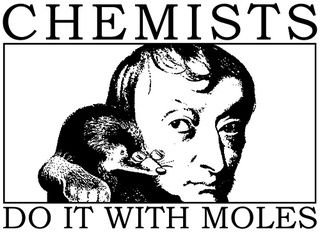 In February we have Groundhog Day, but in October we have a holiday featuring another subterranean critter ( in name, at least) - the Mole. On October 22 at 0602AM devote chemists the world over will don their Mole Day shirts, partake in snacks and share some very punny jokes https://www.thoughtco.com/funny-mole-day-jokes-and-humor-608525. It's a merry time for all, and celebrates a very important tool in chemistry, an SI unit - the mol (mole).
In February we have Groundhog Day, but in October we have a holiday featuring another subterranean critter ( in name, at least) - the Mole. On October 22 at 0602AM devote chemists the world over will don their Mole Day shirts, partake in snacks and share some very punny jokes https://www.thoughtco.com/funny-mole-day-jokes-and-humor-608525. It's a merry time for all, and celebrates a very important tool in chemistry, an SI unit - the mol (mole).
What exactly is a mol?
Generally speaking, it's 6.022x10^23 (Avogadro's number - NsubA) units of a substance. So one mol of water would be composed of 6.022x10^23 molecules. One mol of sand would have 6.022x10^23 grains. To put that in perspective, one mol of sand would be able to cover the entire US in sand about a centimeter thick! More specifically, a mol is a number of atoms or molecules which would have a mass equal to the atomic or molecular weight in grams. This might lead one to ask...
Why is the mol useful to chemists?
Firstly, it allows chemists to make sense of a subatomic world on a scale that makes sense to us. One mol of an element contains 6.022x10^23 atoms. That is a number far too large for us to work with, so calling it one mol greatly simplifies things.
Secondly, it allows us to make meaningful connections about proportions in chemistry. Water, as everyone knows, is H2O. This means it is composed of 2 Hydrogens and 1 Oxygen. Similary, you can say that there is a ratio of 2 mol of H for every mol of O. Proportions are important for synthesising chemicals. Let's say you wanted to make 1 mol of carbon dioxide (CO2). Oxygen is readily available in the air we breathe, but how much Carbon would you need? You can see that 1 mol of CO2 has 1 mol of C. Your handy dandy periodic table will tell you that Carbon weighs about 12 grams per mol. That's it's MOLecular weight. So if you could find a source containing 12 grams of C, and burned it (react with Oxygen) you would produce one mol of CO2.
This simple concept is applied to chemistry on industrial scales to maximize profits and reduce waste and pollution in much the same way that a chef wouldn't buy three tomatoes for a recipe that requires only two.
In essence, the mol unit gives chemists a way to understand the relationships between microscopic particles on a scale that makes sense to us. It gives us the ability to manipulate our surroundings to our design in an way that is efficient and understandable.
Almost every item you buy is the product of some chemist's labor. Every chemist utilizes the mol in their work. Shouldn't you be celebrating Mole Day, too?
Haha mole day! Nice one! Btw I didnt expect it is on Oct haha
Welcome to steemit!!
Nice to meet another chemist!
Feel free to join the steemstem chat channel to meet more science people :)
https://steemit.chat/channel/steemSTEM
Thanks for the tip! I'll check it out :)Thank you very much! Thought I'd try to spread the word about this lesser - known October holiday. Also don't forget to set up your very own chemist tree this holiday season https://www.google.com/search?client=ms-android-verizon&q=chemistree&sa=X&ved=0ahUKEwjd1vjahZnWAhXBfxoKHb8GAXIQ1QIIkQEoAg&biw=360&bih=668#imgrc=62SDpAzMKP5N8M:
Yeah, we had made one in the last Christmas too XDDDD